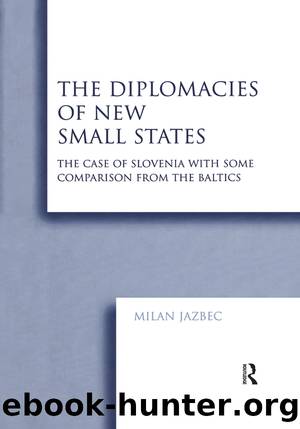The Diplomacies of New Small States: The Case of Slovenia With Some Comparison From the Baltics by Milan Jazbec

Author:Milan Jazbec [Jazbec, Milan]
Language: eng
Format: epub
Tags: Public Policy, Political Science, General
ISBN: 9781351891523
Google: agokDwAAQBAJ
Goodreads: 35196094
Publisher: Routledge
Published: 2001-01-01T00:00:00+00:00
2.3.3 Recruitment
2.3.3.1 Recruitment and Education
In our analysis of sociological aspects of new diplomacies we have established the specifics of their initial personnel composition and drawn attention to the lack of resources, particularly human resources. Directly linked to this are the youth and feminisation of new diplomacies as two of their basic characteristics. After all we have said it is safe to assume that recruitment appears as one of the key processes in the new diplomacies and, in connection with it, the issue of additional diplomatic training of personnel.
Recruitment for new diplomacies at their inception is based on those groups which, for whatever reasons, possess a certain level of diplomatic knowledge and experience, the members of which are interested in working in the diplomatic service and on those who are recruited via other, particularly political channels. Initial recruitment therefore corresponds to the outline of the groups and subgroups which constitute new diplomacies in that period, depending on each individual case. In the initial period, due to the broader situation, including international circumstances, and to the explicit lack of time for recruitment, it is based not simply on a planned and long-term approach - if this is possible and actually ever exists at all - but an important role is also played by improvisation. This is understandable to a certain degree as new diplomacies are tom between the fact that the recruitment of diplomatic personnel, in addition to meeting professional demands, needs to be planned long-term and the fact that, because of the importance of diplomatic service and its suitability for political recruitment, there are great interests in such recruitment.
As there is, initially, a dramatic shortage of personnel and as the new diplomacies have to be set up in a very short period of time, opportunities for political recruitment appear (not only at âzero hourâ but also later), irrespective of the short-sightedness of this approach. The question arises as to whether because of these circumstances a certain degree of political recruitment really is unavoidable and necessary, even useful. Kosin is very clear in his evaluation of this in the case of Slovenia: âIt could not have been any different, as initially. we could not have opened embassies and consulates abroad without contract workersâ (1997:231). It is particularly important that this method of recruitment does not become the dominant and permanent one, otherwise it later contradicts the need for a professional diplomacy, based on relevant education and practical experience.18 Furthermore, recruitment for the most sensitive positions following unprofessional criteria is socially (not just within diplomatic service, but also elsewhere) unacceptable and negative: âPatronage is becoming a national catastrophe! Leading politicians and party leaders trade with top jobs, giving them to upstarts within their own ranks, who are usually without any professional qualifications, and a moment later, they are accepting professional advice from these peopleâ (Keber, 1996:139).
This is why a systematic and organised effort is needed for a transition from the initial phase of recruitment, in which a very unfavourable personnel situation has to
Download
This site does not store any files on its server. We only index and link to content provided by other sites. Please contact the content providers to delete copyright contents if any and email us, we'll remove relevant links or contents immediately.
Collaborating with Parents for Early School Success : The Achieving-Behaving-Caring Program by Stephanie H. McConaughy; Pam Kay; Julie A. Welkowitz; Kim Hewitt; Martha D. Fitzgerald(904)
Entrepreneurship Education and Training: The Issue of Effectiveness by Colette Henry Frances Hill Claire Leitch(673)
Adding Value to Policy Analysis and Advice by Claudia Scott; Karen Baehler(499)
Materializing the Middle Passage by Jane Webster;(497)
Race and American Political Development by unknow(490)
American Government and Politics Today by Steffen W. Schmidt Mack C. Shelley Barbara A. Bardes(488)
Sociological Perspectives of Health and Illness by Constantinos N. Phellas(486)
Human and Global Security : An Exploration of Terms by Peter Stoett(474)
Control Of Oil - Hardback by Kayal(470)
The Disappearance of Rituals: A Topology of the Present by Byung-Chul Han(410)
The Catholic Church and European State Formation, AD 1000-1500 by Jørgen Møller(403)
Advances in Child Development and Behavior, Volume 37 by Patricia J. Bauer(403)
The World According to China by Elizabeth C. Economy(387)
Theories of Counseling and Psychotherapy: A Case Approach by Nancy L. Murdock(381)
Left Is Not Woke by Susan Neiman(371)
Application of classical statistics, logratio transformation and multifractal approaches to delineate geochemical anomalies in the Zarshuran gold district, NW Iran by unknow(366)
Cross-Cultural Child Development for Social Workers by Lena Robinson(358)
Turkey's Relations with the West and the Turkic Republics: The Rise and Fall of the Turkish Model by Idris Bal(353)
Japan's Ainu Minority in Tokyo by Mark K. Watson(341)
